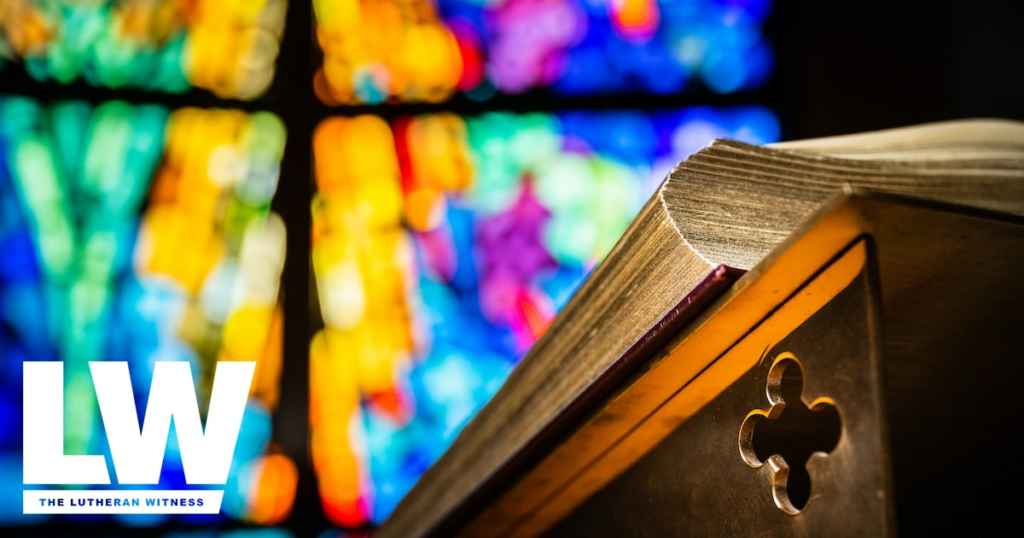by Rev. Dr. David Benke
Why art thou cast down, o my soul? And why art thou disquieted within me? Hope thou in God; for I shall yet praise Him, who is the health of my countenance, and my God! (Ps. 42:11).
In the months angling toward the tenth anniversary of September 11, 2001, I slowly began to realize through the spring and into the summer of 2011 that I was not myself. Interacting with other first responders, the connections were too sharply defined for me to avoid coming to the uh-oh appreciation that I was undergoing once again what is called these days post-traumatic stress disorder or PTSD.
In that frame of mind, the world is very evil, the times are waxing late and life loses its savor, its meaning. Most of all, emotional responses and negative mental patterns are not able to be controlled, which makes for damaged immune system responses and physical problems. And for a Christian, it is difficult unto impossible to find spiritual peace or the presence of the Almighty.
Along the way–and this was true for me in the months and several years after September 11, 2001–the Psalms became (again) vividly personal for me. In my situation, the closer we came to September 11, 2011, the more the clouds lifted for me, as the healing community of the faithful and so many friends and civic partners joined in commemoration and reflection. And so Im able to write a little bit about it.
Psalm 40 is a reflection on a godly attitude of patient trust in the Divine First Responder: I waited patiently for the Lord; and He inclined unto me, and heard my cry. He brought me up also out of an horrible pit, out of the miry clay and set my feet upon a rock, and established my goings. And He hath put a new song in my mouth.
These are great thoughts, and as Im leading our parish choir, they are my exact personal experience: I have new songs in my mouth. They are songs of praise to God for His help and salvation. And were going to sing them together. Wonderful!
However, during the distress, the stress, the period of anxiety, the depression, that end-game is not envisioned, not even a little bit. There is no singing, no new song. For me, when I am not able to play my instruments and sing, I know Im in the horrible pit. And there I was.
So the words of Psalm 42, thrice repeated, resonated more accurately. The PTSD interior framework is, What in the world is happening to me, and why am I not able to put these things out of my mind? Why am I not in control of my own thought process? Whats going on? And the twin beams of depression and anxiety are directly included in the Psalmists cry. Why art thou cast down O my soul, and why art thou disquieted within me?
Depression and anxiety make for a whipsaw effect. Im stuck. Its bad. Im stuck. Its bad gives way to Theres no way out of this. There has to be an exit, and I cant find it.
For me, the presenting circumstance and horror has always been all that smoke, the penetrating smell and the knowledge that the smoke and dust covering us at Ground Zero, a zone I estimated early on as being six feet deep and sixty miles in circumference, included the atomized remains of people. A small group of Lutheran religious leaders trudged around the 16-acre site on September 18, 2001, and the most vivid recollection for me was the response of the members of the elite rescue teams we greeted. When we put a hand on their shoulders, each person dropped to the ground in tears and requested prayer. They could not rescue the dead. They could not bring the atomized out of the pit. They could not lift 50-ton beams and hope to hear a cry for help. The situation was out of their control and ability to perform their duty as rescuers. And yet they fought on.
Thats the internal process for someone in PTSD. No control . . . must fight on . . . cant fight on . . . why bother . . . but must fight on.
And so the Psalmist bears us up even in what seems like an exhortation flung to the foul wind of his own empty spirit: Hope thou in God! Because hes been through what we go through. My tears have been my meat day and night, while they continually say unto me, Where is thy God? And yet the Psalmist understands that all seeking and searching in these times is not for self or even about self but about the search for God. My soul thirsteth for God, for the living God.
So the cry to self to hope is not flung heedless to the wind but is anchored in past experience and confidence remembered even as deep cries unto deep. Life does belong to God, and God is, in fact and in truth, the Author of life. That remains bedrock.
And so from the far side of disorder, when feet are solidly placed on the Rock again, the last words ring the most true: For I shall yet praise Him, who is the health of my countenance and my God. The health of my countenance . . . how about that? I smile as I write this: The glow of life, the sparkle in the eyes, the spring in the step, all of it is from God and goes to God. O give thanks unto the Lord, for His mercy endureth forever!
—
About the Author: The Rev. Dr. David H. Benke is president of the LCMS Atlantic District.
October 2011





